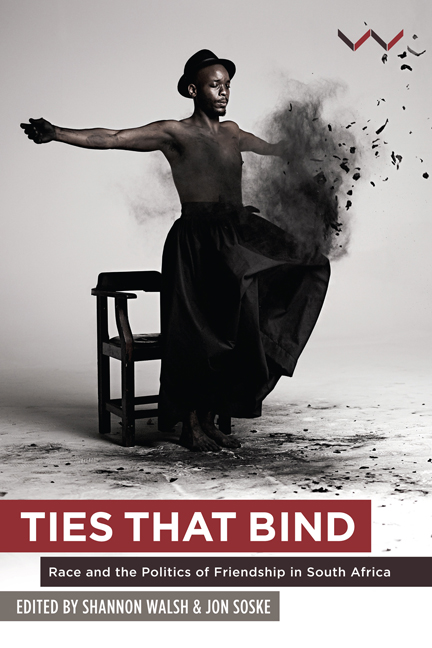Book contents
- Frontmatter
- Contents
- List of Figures
- Epigraph
- Fanon's Secret
- 1 Thinking About Race and Friendship in South Africa
- 2 With Friends Like These: The Politics of Friendship in Post-Apartheid South Africa
- 3 Bound to Violence: Scratching Beginnings and Endings with Lesego Rampolokeng
- 4 Afro-Pessimism and Friendship in South Africa: An Interview with Frank B. Wilderson III
- 5 The Impossible Handshake: The Fault Lines of Friendship in Colonial Natal, 1850-1910
- 6 The Problem With ‘we’: Affiliation, political Economy, and the Counterhistory of Nonracialism
- 7 Affect and the state: Precarious Workers, The Law, and the Promise of Friendship
- 8 ‘A Song of Seeing’: Art and friendship Under Apartheid
- 9 ‘Friend of the Family’: Maids, Madams, and Domestic Cartographies of Power in South African Art
- 10 Corner Loving: Ways of Speaking about Love
- 11 Kutamba Naye: In Search of Anti-Racist and Queer Solidarities
- 12 The Native Informant Speaks Back to The Offer of Friendship in White Academia
- Acknowledgments
- Contributor Biographies
- Index
3 - Bound to Violence: Scratching Beginnings and Endings with Lesego Rampolokeng
Published online by Cambridge University Press: 21 April 2018
- Frontmatter
- Contents
- List of Figures
- Epigraph
- Fanon's Secret
- 1 Thinking About Race and Friendship in South Africa
- 2 With Friends Like These: The Politics of Friendship in Post-Apartheid South Africa
- 3 Bound to Violence: Scratching Beginnings and Endings with Lesego Rampolokeng
- 4 Afro-Pessimism and Friendship in South Africa: An Interview with Frank B. Wilderson III
- 5 The Impossible Handshake: The Fault Lines of Friendship in Colonial Natal, 1850-1910
- 6 The Problem With ‘we’: Affiliation, political Economy, and the Counterhistory of Nonracialism
- 7 Affect and the state: Precarious Workers, The Law, and the Promise of Friendship
- 8 ‘A Song of Seeing’: Art and friendship Under Apartheid
- 9 ‘Friend of the Family’: Maids, Madams, and Domestic Cartographies of Power in South African Art
- 10 Corner Loving: Ways of Speaking about Love
- 11 Kutamba Naye: In Search of Anti-Racist and Queer Solidarities
- 12 The Native Informant Speaks Back to The Offer of Friendship in White Academia
- Acknowledgments
- Contributor Biographies
- Index
Summary
I first met Lesego Rampolokeng at the beginning of the millennium, a turning point in the history of our country, a time of rapid change and radical uncertainty, but also one of tremendous excitement and infinite possibility. Everything was being questioned: race as well as social, political, religious, and cultural life. To my generation, the dream of a free South Africa provided a space for new possibilities, new audacities, transgressions, and a new quest for collective identity.
This was the South Africa that Rampolokeng and I, together with fellow South African authors Ivan Vladislavić, Phaswane Mpe, K. Sello Duiker, and Nadine Botha were invited to represent at the 2003 Crossing Border Festival in Den Haag, Netherlands. We traveled as a group and in a very short period of time spontaneous friendships were forged — especially among the young writers. Sello and I spent many afternoons walking Den Haag's streets, discussing the themes that propelled our work — the volatile intersections between race, class, and gender that continued to fracture post-apartheid society, especially in Cape Town, whose cosmopolitan character was strangely echoed in our surrounds.
We also talked about our dreams for other forms of belonging, of new friends, queer utopias, and different communities. Sex and desire with their erotic drives had a great part in it. As did politics. As Sello (Duiker 2001: 381) wrote in The Quiet Violence of Dreams: ‘There comes a time when we must face who we are boldly, when we must listen to the music of our dreams and delight ourselves with courage as we grasp our destinies firmly in our hands.’
In our youth and bravado — our naivety — we were unwilling, and perhaps unable to listen to the words of caution coming from the older writers in the group — Vladislavić and Rampolokeng — whose complex reading of postapartheid South Africa undercut our fervor. We should have paid attention. A year later, both Phaswane Mpe and K. Sello Duiker were dead — Sello tragically by his own hand. Their deaths had a stark impact on me. On one hand I felt betrayed: what of our shared dreams? Our shared futures? On the other hand, I experienced an excruciating sense of loneliness, of being alone, as a writer, but also as a person.
- Type
- Chapter
- Information
- Ties that BindRace and the Politics of Friendship in South Africa, pp. 48 - 69Publisher: Wits University PressPrint publication year: 2016



